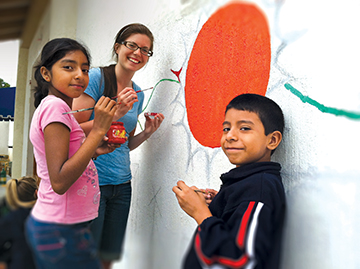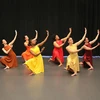by JORDYN HOLKA, ’15
Consistent with Fredonia’s large-scale rebranding initiative last year, the Department of World Languages and Cultures found itself jumping on the bandwagon as well, officially changing its name from the Department of Modern Languages and Literatures beginning in the Fall 2014 semester.
“We thought we should adjust the name of the department to what we’re actually doing,” said Department Chair Juan De Urda. “It’s not just literature. Literature is important, but we do more. We expose students to movies, TV, magazines — everything that is involved in the culture of a country, we include it here. So I thought it was more inclusive to talk about cultures, because literature is part of culture.”
Dr. De Urda became the chair in 2013, taking over for Dr. Carmen Rivera, who is now focusing more on her teaching after more than seven years in that position. In early 2014, De Urda proposed the name change to the department. Over the course of the spring semester it gained the support of his fellow faculty members, College of Liberal Arts and Sciences Dean John Kijinski and Provost Terry Brown. The change was approved by the University Senate without any objections.
 |
| Sophomore Terese Caiazza, French and Women’s and Gender Studies double major 2014 graduate Kerrin Murphy, who earned a bachelor’s degree in Spanish with a minor in International Studies, paints a mural with local children when she studied abroad in Oaxaca, Mexico. |
While De Urda said that a handful of students were polled in an informal way as to their thoughts on the change before it happened, most found out after the fact, over the summer or at the beginning of the school year. Overall, responses have been positive.
“I first heard about it on Facebook [in August],” said senior Will Webber. “I’m pretty sure it was the department’s Facebook page, saying, ‘We changed our name!’ and I was like, ‘Oh, cool!’”
Webber is a French, Spanish and International Studies triple major with an extensive background in Adolescence Education and a minor in Political Science. He is extremely involved in the department and supportive of the change.
“I like it. I really do. I think it makes the department sound more interesting,” he said. “If you say, ‘World Languages and Cultures’ instead of ‘Modern Languages and Literatures,’ to me, it gives it more of a ‘spice.’ Now, we’re opening [the department and its students] up to more possibilities, more learning opportunities.”
“I really like the addition of the word, ‘culture,’” added sophomore Terese Caiazza, a French and Women’s and Gender Studies double major with a Spanish minor. “As we’re studying these languages, we’re also learning a great deal about the cultures in the places where these languages are spoken. A lot of the options for electives in our major are culture-based classes. So, I was glad culture was added.”
De Urda is quick to point out that this change doesn’t mean that there has been a significant change to the department’s programs. “We didn’t change our way of doing things — our goals.”
The department still offers Spanish and French majors, including an option for an education specialization in each, as well as classes in German, Russian and Italian. Two relatively new features are an Italian studies minor (prior to a few semesters ago, students could only access up to two semesters’ worth of Italian classes) as well as Arabic classes.
While enrollment in the humanities is challenging at the moment, De Urda is pleased that his department has weathered the trend. He noted that, while some students do come to Fredonia as freshmen having declared a French or Spanish major, it is more common for them to either add a major or switch into the department from another major such as Liberal Arts once they are enrolled and involved in classes.And once they are in the department, students become part of a special family.
“I like the office and how everybody is close together and everybody knows each other,” added Caiazza. “I just like the familiarity of everybody.”
“I’m really proud of the fact that the classes are small and that the professors actually know who you are,” agreed Webber. “I [also] really like the fact that there are professors from basically all over the world. The chair is from Spain; we have a professor from Columbia; we have a professor from Puerto Rico; we have a professor from France; and then we have the few American professors.”
De Urda also expressed pride in his team, saying, “I think we are a strong department of very dedicated faculty, [especially] considering that Fredonia is not a big institution.”
With all of this pride and devotion, it would be easy to grow comfortable within the department, but De Urda, Webber, Caiazza and other members have assumed the opposite mentality. Just as the campus as a whole has been steadily diversifying and evolving, the Department of World Languages and Cultures looks to the future, too, considering how it can improve over the years to come.
At some point, De Urda would like to make the German and Russian programs into minors. “I would like to offer a lot of languages if we could, but I think it is better if we consolidate what we have — make a stronger program.” He added, “Another goal is making a stronger foreign language requirement for everybody within the general education requirements. We have been discussing some possible changes as a proposal in
University Senate.”
Caiazza is thrilled with the recent addition of Arabic to the curriculum, and hopes the future of the department includes a stronger focus on conversation within the study of each language.
Webber agreed, saying he hopes for “more interactive language opportunities” in the coming years. “I hope in the near future that the Department of World Languages and Cultures will actually be the Department of World Languages and Cultures by adding, maybe, Chinese, Korean, Japanese — more world languages.”
De Urda concurs, adding that, while it is respectful of its history, the department has, does and will always focus on adding to the education of its students, increasing its diversity and finding new ways of doing things. The name change is simply a way to better communicate that approach.
2014 graduate Kerrin Murphy, who earned a bachelor’s degree in Spanish with a minor in International Studies, paints a mural with local children when she studied abroad in Oaxaca, Mexico.



